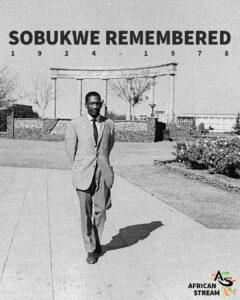South African freedom fighter and pan-African intellectual Robert Mangaliso Sobukwe would have turned 100 today.
 Sobukwe was born on 5 December 1924 in a Black township on the outskirts of Graaff-Reinet in today’s Eastern Cape province. After a childhood marked by academic excellence, he enrolled at Fort Hare University in 1947, an institution whose alumni included many anti-colonial icons such as Robert Mugabe, Oliver Tambo and Nelson Mandela.
Sobukwe was born on 5 December 1924 in a Black township on the outskirts of Graaff-Reinet in today’s Eastern Cape province. After a childhood marked by academic excellence, he enrolled at Fort Hare University in 1947, an institution whose alumni included many anti-colonial icons such as Robert Mugabe, Oliver Tambo and Nelson Mandela.
Like many before him, it was at Fort Hare that Sobukwe’s revolutionary flame was lit. Becoming a prominent figure on the university’s political scene, he’d serve as the president of the Students Representative Council and Secretary of the newly-formed African National Congress Youth League (ANCYL).
After University, Sobukwe briefly worked as a high school teacher before landing a job in the African Studies department at Witwatersrand University in Johannesburg.
In 1958, Sobukwe led members of the ANC, who, disgruntled by the party’s ‘liberal-left multiracialist’ policies, ceded from the organisation and formed the Pan-Africanist Congress (PAC).
On 21 March 1960, Sobukwe led hundreds of PAC members and citizens in a march to Orlando police station in Soweto in protest against the so-called Pass Law, which restricted the movement of Black South Africans. A similar protest also took place on the same day in the township of Sharpeville, where 69 people were gunned down in cold blood when apartheid forces opened fire on the peaceful rally. Sobukwe and other PAC leaders were arrested in the aftermath of the demonstrations. He was later sentenced to a three-year prison term.
After completing the prison sentence, Sobukwe was again detained under the so-called General Law Amendment Act, which allowed apartheid authorities to prolong the imprisonment of any political prisoner indefinitely. The law became infamous and was dubbed the ‘Sobukwe clause.’
In 1969, Sobukwe was released from Robben Island and subsequently banished to Kimberly in the Northern Cape province, where he was placed under 12-hour house arrest and restricted from engaging in political activities.
While in Kimberly, he fell ill with lung cancer. Restrictions imposed on his movement complicated his attempts to receive timely medical care. By the time doctors treated him in Johannesburg and Cape Town, his condition had deteriorated and he succumbed to the disease on 27 February 1978.
By the time of his death, he had made a profound and lasting impression on the struggle against apartheid. Nearly five decades have passed since Sobukwe’s death. However, his ideas for a united and prosperous Africa continue to resonate with many people on the continent and beyond who are committed to ridding it of all colonial and imperial vestiges.
Sources:
https://southafrica-info.com/history/robert-sobukwe-one-race-human-race/
